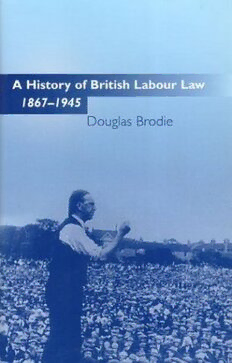
A History of British Labour Law, 1867-1945 PDF
272 Pages·2003·11.174 MB·English
Most books are stored in the elastic cloud where traffic is expensive. For this reason, we have a limit on daily download.
Preview A History of British Labour Law, 1867-1945
Description:
In the UK the received wisdom has tended to be that, historically, British labor law was abstentionist or non-interventionist, best epitomized by the words of Lord Wedderburn who has written that ...collective bargaining has developed in a system which depends very little on the law, which is covered by very few decisions of the judges, and which is controlled by statute very little, if at all. It is not until we reach the Industrial Relations Act 1971 that we discover the first attempt in peacetime to move to a legally regulated system. However, the accuracy of this non-interventionist depiction appears to very much depend on the period which is examined, which is why an historical perspective is needed in order to understand the significance of the current shape and scope of British labor law. This work re-examines the received interpretation by looking at both the role given to law, and that anticipated and argued for it, during the most formative period of its development, the period between 1867 and 1945. The book also revisits the debate about war-time legislation which has tended to be viewed as standing apart from mainstream labor law, but which the author demonstrates to have important linkages to the past and present.
See more
The list of books you might like
Most books are stored in the elastic cloud where traffic is expensive. For this reason, we have a limit on daily download.
